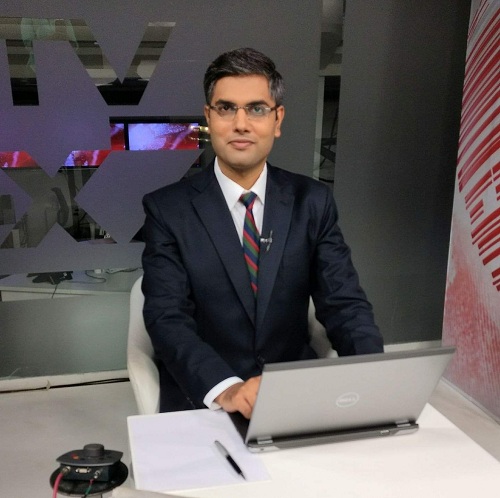
 Rohit Wellington
Rohit Wellington

On March 9, 1954, when the famous journalist Edward R Murrow exposed the then junior senator from Wisconsin -- Senator Joesph McCarthy, he ended his programme with these lines from Shakespeare’s Julius Caesar: The fault, dear Brutus, is not in our stars, but in ourselves.
Over half a century later, and half way across the world, these lines still ring true. As we enter the new decade -- the 2020s – it’s time to reflect, and perhaps even acknowledge, that the situation we are in, as a society, has not been created by those in power, but merely exploited by them and rather successfully.
We have heard a lot about the State and how it has manipulated and even arm-twisted the media. Let’s talk a little bit about us as a society – why are we angry, intolerant and deeply polarized. There’s fear and resentment among us. In our conversations, there is little acceptance of the other point of view and certainly very little nuance.
Author Pankaj Mishra, writing about today’s individuals in his book The Age of Anger, argues, “Their evidently natural rights to life, liberty and security, already challenged by deep-rooted inequality, are threatened by political dysfunction and economic stagnation, and, in places affected by climate change, a scarcity and suffering characteristic of pre-modern economic life. The result is, as Arendt (a political philosopher) feared, a ‘tremendous increase in mutual hatred and a somewhat universal irritability of everybody against everybody else’, or ressentiment. An existential resentment of other people’s being, caused by an intense mix of envy and sense of humiliation and powerlessness, ressentiment, as it lingers and deepens, poisons civil society and undermines political liberty, and is presently making for a global turn to authoritarianism and toxic forms of chauvinism.”
Let’s put this in the context of media today. Take an example. There are two programmes. One is a debate on ‘danda’ vs ‘tubelight’ – political jibes exchanged between Prime Minister Narendra Modi and Congress leader Rahul Gandhi, and the other an interview with Winnie Byanyima, the executive director of Oxfam International, who has been raising an alarm over rising economic inequalities especially in India, where, according to their report, the top 1% of the population holds over four times the wealth of the poorest 70% of population. Which one do you think is going to get more viewership?
Take another example. Two different channels are debating the same topic -- Indian economy. One is a shouting match between politicians or ‘experts’ with one side refusing to even acknowledge the deepening slowdown and the other calling for the resignation of the Finance Minister; and the other channel has a discussion between economists, politicians and former government advisors on steps the government can take to revive the economy. Which show is likely to get more viewership? And which one will leave you more educated about the crisis at hand?
Let’s now flip the question. If you as news editors were confronted with these choices, which show would you put on air? Therein lies the answer to the question – is it pragmatism over principles in journalism today?
Let’s now turn the gaze inwards. In this noisy world of today’s journalism, are we being the voice of the voiceless? We must rediscover our roots and, in doing so, look at the way forward.
Seymour Hersh, the Pulitzer-prize winning journalist, reflecting on his days as an investigative reporter says, “There were no televised panels of “experts” and journalists on cable TV who began every answer to every question with the two deadliest words in the media world – “I think.””
What much of journalism, particularly on television, is serving is opinion. What’s largely missing are the facts. That’s the first challenge we face. Opinion is cheap, facts are sacred. In this age of fake news and half-truths, is the media being the flagbearer of facts? Are we challenging the official narrative or being party to it? Seymour Hersh writes, “I always thought it was a newspaper’s mission to search out the truth and not merely to report on the dispute.” Are we doing that or have we become what another journalist John Pilger calls ‘a breeding ground for censorship by omission, the most virulent form’?
As a consequence of the dearth of facts, what we are witnessing today is the erosion of trust in the media. That’s the second challenge. In fact, the trust deficit is in pretty much every institution of civil society now – government, big businesses and even the Church. The only institution that is perhaps trusted by the people is the military.
British poet Humbert Wolfe in his poem The British Journalist wrote: ‘You cannot hope to bribe or twist, thank God! the British journalist. But, seeing what the man will do unbribed, there's no occasion to.’
Much of journalism has been reduced to compliance or silence when it comes to speaking truth to those in power. Yes, there’s noise and lot of it on prime-time television, but against what? Against gender injustice? Against denial of basic freedoms and rights to the marginalised? Against malnutrition? Against rising income inequality? No. We, with some notable exceptions, have created imagined enemies and are busy fighting them in our studios because that seems an easier thing to do and, gets the TRPs.
The third challenge we face is the degeneration of language. ‘Tukde tukde gang’, ‘urban naxals’ are familiar phrases in public discourse now. What’s deeply problematic is that the administration is setting the language and most of the news networks are simply talking that language. Isn’t our job as journalists to take a step back and interrogate the administration’s claims, especially those that get right to the core of our identity as a nation? Shouldn’t we view such phrases through the prism of our tradition and values before we use them the way administration wants?
Fourth is the collapse of empathy in journalism. Journalism has become highly elite and feels extremely distant from the experiences of people. So many of our stories are for highly educated and affluent people. Shouldn’t we not just speak ABOUT but also speak TO people whose voices we claim to be? Have we told our stories in a way in which it feels true to the people who are really experiencing it?
Fifth challenge is the forgotten ability to listen. Switch on your television at 9 pm and look at most news channels. Who is listening to whom? Is the viewer any wiser at the end of the programme? Have we made India a more knowledgeable place through such debates? After 17 seasons as host of The Current on Canadian Broadcasting Corporation, radio anchor and journalist Anna Maria Tremonti, in her goodbye speech, said, “The most important thing I have learned … is how to listen. Not how to talk, not how to ask questions, but how to listen.” She goes on to say, “In a world where so many people are shouting at each other, where so many refuse to hear anything but their own voice, the ability to hear another side, to think differently, to question yourself, to learn something new, that is a gift.”
Let me now speak about the future and the 5 big issues that we as media persons should be conscious about.
The first is rapid urbanization. With increasing concentration of people in urban areas, everyone is jostling for space in these dense magnets. But are vulnerable communities able to gain from the growth of urban spaces or have they been left excluded? Author Pankaj Mishra writes, “individuals with very different pasts find themselves herded by capitalism and technology into a common present, where grossly unequal distributions of wealth and power have created humiliating new hierarchies.” Look at Delhi. Have all the areas developed equally or only certain areas have been able to enjoy the fruits of development? Studies show that in cities, areas with larger Muslim populations and those with larger immigrant communities are likely to face more institutional apathy than other neighbourhoods. The result, therefore, is frustrated hopes and passionate identity assertion.
The second is digitization. There has been a deep democratization of media. Everyone with a phone and a camera can now be a reporter. The reach of news has increased, so has the speed. But with that has come the menace of fake news, videos being morphed and forwarded to create divisions in society. There is rising concern of fake news being used as a weapon. According to 2018 Edelman Trust Barometer, 73% of the respondents in India agree that the average person does not know how to tell real news from fabricated content. Countries like Singapore have come up with laws to combat fake news. Should India have such a law? And how do we determine where the curbs on fake news end and attack on free speech begins?
The third is Dalit and gender politics. India is going through a churn in these areas. Chandrasekhar Azad has emerged as the new icon of Dalits. The young lawyer-turned-politician has been at the forefront of many agitations demanding equal rights for marginalized communities. We have also seen the rise of another Dalit leader Jignesh Mevani in Gujarat and of political formation Vanchit Bahujan Aghadi in Maharashtra. Gender politics too is witnessing a change. There are a record 78 women MPs in the Lok Sabha elected last year. Atishi, the St Stephen’s and Oxford-educated Rhodes scholar, is now a lawmaker in Delhi Assembly. In the 2019 Lok Sabha elections, Trinamool Congress had fielded 41% women candidates, unprecedented for any election ever in India.
The fourth is short term-ism – when politicians fail to look beyond the next election and the media is unable to look beyond the latest news cycle. It’s when ‘now’ commands so much attention that the interests of the future generations is pushed beyond the horizon. Look at US President Donald Trump’s visit to India. The visit, the hugs and handshakes, all seemed choreographed for the cameras. But was the spectacle worth the substance? Or was it a visit designed to boost the image of Donald Trump in an election year? The same day that President Trump landed in India, many citizens including a policeman lost their lives in riots in Delhi. How many media organisations made the communal violence in the national capital their top headline?
The last is the market’s homogeneity. The market and its buying-selling has commodified news. It has become a race to the bottom, to land at the lowest common denominator of TRP/advertising. Forget truth, even uncomfortable news won't sell; instead comfortable and palatable news for the largest number (logic of market) is preferred. This largest number is made of mostly male & mostly majoritarian -- worldwide.
As the society evolves, so does media. We are witnessing many changes around us but the basic principles for journalists remain the same. Our mission to seek the truth and be the voice of the voiceless. That hasn’t changed. But there’s something though that needs to change. When Edward Murrow broadcast the famous episode of his show See It Now on Senator McCarthy, he and his producer Fred Friendly had to buy their own advertising.
(The writer is Senior News Editor & Anchor – NDTV)